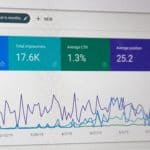The Importance Of Analytics
Decision-making driven directly by data is the key to many things. In marketing, it can mean the difference between using your budget effectively and losing money. How would you, for instance, know when to send an email to maximize open rate without having data about your audience’s past email behaviors? Knowing exactly where your marketing dollars are going, knowing when to expect high click-through-rates, and from whom, understanding your customers – these are all invaluable capabilities made possible by analytics and data. It’s of course possible to send that email without important data on hand, but how effective would it be? How could it be better?
Marketing Analytics
Analytics allow you to understand how your marketing efforts are doing and tweak them for better ROI. Beyond direct interactions and surveys, there’s no better way to understand your customers and their behavioral trends than assessing your site’s analytics.
Important Information Derived from Analytics
Just some of the important details you can gather from analytics are:
- The demographics of your audience – Understand who is visiting your website, their ages and genders and how they interact with your website. Including: bounce rate, average session duration, % new sessions, and the pages they view per session. This information can help you refine your audience targeting, understand the types of information your audience might appreciate (based on age and other factors) and better customize your ad creative.
- The most effective landing pages on your site – Analytics help you to know which pages are visited the most on your site so that you can better understand what users want to learn and see from your company.
- What channels are bringing users to your site – Are social channels bringing users in? Or organic search? Or paid search?
- What’s driving calls? Call tracking offers insight into which ads, landing pages, etc. are working by tracking click-to-call.
And there’s so much more.
Paid Search and Analytics
Analytics have always played a large part in Search Engine Optimization and Paid Search. Understanding which landing pages make users tick, testing varied landing pages against each other via bounce rates and conversion rates and understanding what kind of language and imagery convinces users to purchase from you are all core components of building your strategy. Within Google Analytics specifically, you can segment organic and paid search for increased visibility into each. You can also engage in important attribution modeling that allows you to look beyond the last-click and gain greater insight into the length of the customer journey.
If you’re not paying attention to analytics, you’re flying blind while trying to reach the most people on a budget, and that just doesn’t work.
Data-Driven Marketing
There is no absence of data today – with a multitude of analytics for your website, your social properties, and just about everything else. But how do you cut through the noise and really make data-driven decisions? We’ve covered the importance of testing before – and this is the first step. Testing different strategies is the only way to come to an accurate conclusion as to what your customer really wants – and data-driven testing is even better.
There are several Data Management Platforms (DMPs) that help companies create profiles of their customers that are detailed and targeted to specific experiences across a variety of platforms. In fact, recent research by Oracle Marketing Cloud and Econsultantcy showed a dramatic increase in companies investing in these DMPs to improve their marketing going forward. Starting small, with incremental data sets, allows you to cut through enormous piles of data to actually make a difference.
What do you think of data-driven marketing? Tell us on Facebook!
Recent Posts
You’ve heard it here, you’ve heard it there, you’ve heard it from any SEO agency:…
Every month, our SEO team looks back on the previous months to determine wins, losses,…















